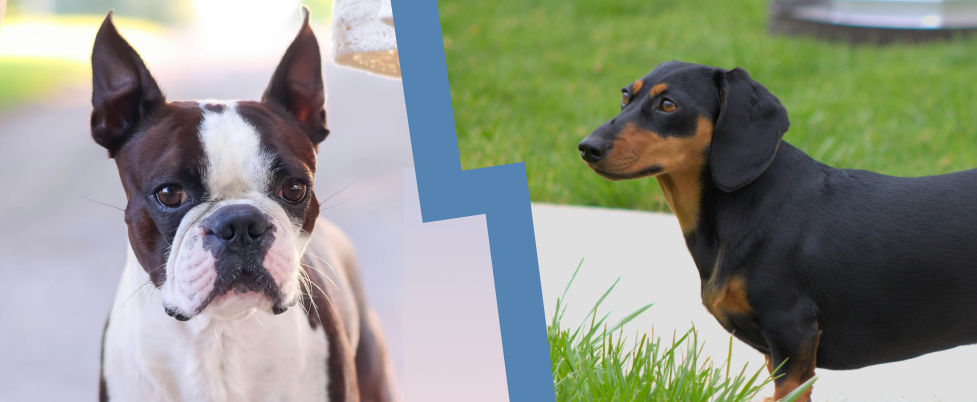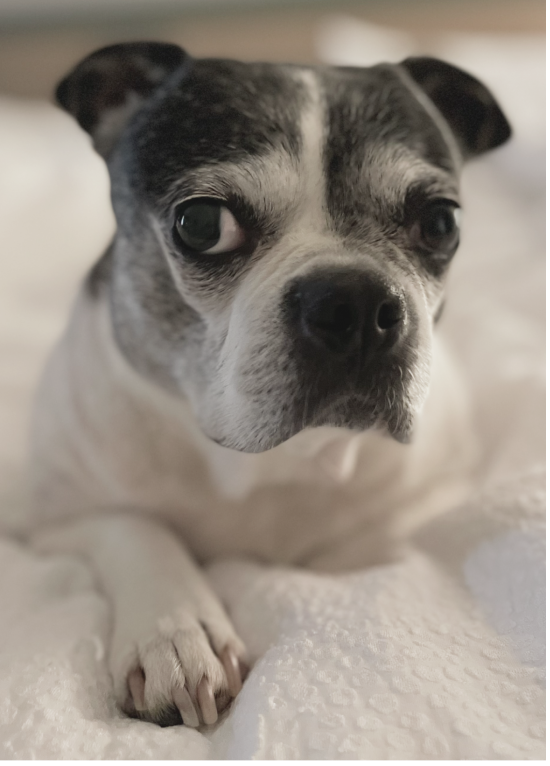BOSTON TERRIER MIXES

Disclaimer: I am not a veterinarian. Always consult a professional for guidance specific to your dog’s breed and needs.
Introduction
The Boston Terrier Dachshund mix, commonly known as the Bo-Dach, is an affectionate, lively, and intelligent hybrid that brings together the best traits of two beloved breeds. This guide explores everything you need to know about the Bo-Dach-including appearance, temperament, health, training, and key content gaps for prospective owners.
Breed Origins and History
The Bo-Dach is a cross between the Boston Terrier and the Dachshund, both of which have rich histories and loyal followings. The Boston Terrier, known as the “American Gentleman,” is celebrated for its tuxedo markings and sociable personality. The Dachshund, famous for its long body and bold spirit, was originally bred for hunting. The Bo-Dach aims to blend the Boston’s friendly, trainable nature with the Dachshund’s curiosity and determination, resulting in a compact, loving companion.
Appearance: What Does a Bo-Dach Look Like?
Physical Traits:
- Size: Height ranges from 9–18 inches; weight from 8–60 pounds, depending on whether the Poodle parent is Toy, Miniature, or Standard.
- Build: Small, sturdy, and muscular, often with a longer body reminiscent of the Dachshund.
- Coat: Short, smooth, and low-maintenance; colors include black, brown, brindle, white, gray, and various combinations
- Face & Ears: Small head, large muzzle, expressive eyes, and either perky or floppy ears.
- Tail: Medium-length, straight or slightly curved.
Each Bo-Dach is unique, even within the same litter, due to the wide range of possible combinations from both parent breeds.
Temperament and Personality
The Bo-Dach is prized for its:
- Affection: Bonds closely with family and enjoys snuggling
- Playfulness: Loves games, toys, and interactive play sessions
- Loyalty: Protective of their owners, sometimes to the point of being overprotective
- Curiosity: Inherits the Dachshund’s strong sense of smell and tendency to explore
- Intelligence: Quick learners, but may show stubbornness from both parent breeds.
- Sociability: Generally friendly with people and other pets when socialized early
Bo-Dachs are known for being vocal, often barking to communicate or alert their owners. This trait can be managed but not entirely eliminated
Activity Level and Exercise Needs
- Moderate Energy: Needs daily walks, playtime, and mental stimulation.
- Games: Enjoys fetch, scent games, and interactive toys.
- Apartment Friendly: Adaptable to apartment living if exercised regularly.
- Digging Instinct: May dig in the yard or garden due to Dachshund heritage.
Training and Socialization
Training Tips
- Start Early: Begin training and socialization as soon as your puppy comes home.
- Positive Reinforcement: Use treats and praise to encourage good behavior.
- Short, Fun Sessions: Keep training sessions brief and engaging.
- Consistency: Use clear, consistent commands and routines.
- Patience: Expect some independence and stubbornness; persistence pays off.
Socialization
- Expose to New Experiences: Introduce your Bo-Dach to different people, pets, sights, and sounds in a positive way
- Puppy Classes: Offer valuable learning and socialization opportunities
- Family Involvement: Encourage all family members to participate in training and play
Early and consistent socialization is crucial to prevent shyness, fear-based behaviors, or excessive protectiveness.
Health and Lifespan
- Average Lifespan: 10–16 years, with most Bo-Dachs living 10–13 years.
Common Health Issues
Bo-Dachs may inherit health concerns from both parent breeds:
- Intervertebral Disc Disease (IVDD): Due to the Dachshund’s long back, Bo-Dachs can be prone to spinal issues.
- Patellar Luxation: Knee joint issues common in small breeds.
- Obesity: Both breeds can gain weight easily; portion control is essential.
- Dental Problems: Small breeds are prone to dental disease; regular brushing is important.
- Eye Disorders: Both breeds can develop cataracts or other eye conditions.
- Allergies and Skin Issues: Some Bo-Dachs may be prone to allergies.
- Separation Anxiety: Prone to anxiety if left alone for long periods.
Preventative Care
- Regular Vet Visits: Early detection and management of health issues are key.
- Weight Management: Feed a balanced diet and avoid overfeeding.
- Dental Hygiene: Brush teeth regularly to prevent dental disease.
- Joint Support: Provide a joint-healthy diet or supplements as recommended by your veterinarian.
- Exercise Caution: Limit jumping from heights to protect the spine.
Grooming and Maintenance
- Coat Care: Short coat requires minimal grooming-weekly brushing is usually sufficient.
- Bathing: Bathe as needed, typically every 1–2 months.
- Nail and Ear Care: Trim nails and check ears regularly for debris or infection.
- Wrinkle Care: If your Bo-Dach inherits facial folds, clean them to prevent irritation.
Bo-Dachs are not hypoallergenic and shed seasonally.
Nutrition and Feeding
- Balanced Diet: Choose high-quality dog food formulated for small breeds.
- Portion Control: Feed 1–2 cups of dry kibble per day, split into two meals.
- Healthy Treats: Use low-calorie snacks for training.
- Consult Your Vet: Adjust portions based on age, activity level, and metabolism.
Living Environment
- Apartment Friendly: Compact size and moderate exercise needs make Bo-Dachs suitable for apartments or houses
- Companionship: Thrive on attention and may develop separation anxiety if left alone for long periods
- Secure Yard: A fenced yard is ideal for safe outdoor play and exploration, especially given their curiosity and digging instincts
Bo-Dach vs. Other Designer Breeds
| Feature | Bo-Dach (Boston/Dachshund) | Boston Terrier Pug Mix | Boston Terrier Beagle Mix |
| Size | 10–14 in, 10–32 lbs | 10–25 lbs | 15–25 lbs |
| Temperament | Playful, loyal, curious | Playful, loving | Curious, affectionate |
| Coat | Short, low-maintenance | Short, low-shedding | Short, low-shedding |
| Exercise Needs | Moderate | Moderate | Moderate to high |
| Good with Kids | Yes | Yes | Yes |
What Prospective Owners Need to Know
1. Personality Variability
Bo-Dachs can vary widely in temperament-even within the same litter. Some may be outgoing and friendly, while others may be more reserved or stubborn. Prospective owners should be prepared for a range of personalities.
2. Vocalization
This breed is known for being vocal, with a strong tendency to bark. While training can help manage this, it is unlikely to be eliminated entirely, which may not suit all living situations.
3. Separation Anxiety
Bo-Dachs are prone to separation anxiety and may become destructive or overly anxious if left alone for long periods. Early training and gradual alone-time conditioning can help.
4. Housebreaking Challenges
Stubbornness and independence can make housebreaking a challenge. Consistency, crate training, and positive reinforcement are essential.
5. Digging and Prey Drive
The Dachshund’s hunting heritage can manifest as digging and a strong prey drive. Secure fencing and supervision outdoors are important.
6. Allergy Considerations
Bo-Dachs are not hypoallergenic. Prospective owners with allergies should spend time with the breed before committing.
7. Rescue and Adoption
Bo-Dachs are not as common as some other designer breeds but may be found in rescues or through breed-specific organizations. Adoption is a rewarding option.
Frequently Asked Questions
Are Boston Terrier Dachshund mixes good with children?
Yes, Bo-Dachs are generally friendly and affectionate with children, making them excellent family pets when properly socialized.
How much exercise do Bo-Dachs need?
They require moderate daily exercise-at least 30–45 minutes of walks and playtime.
Are Bo-Dachs easy to train?
They are intelligent but can be stubborn. Positive reinforcement and consistency are key.
How long do Bo-Dachs live?
The average lifespan is 10–13 years, with some living up to 16 years with proper care.
Do Bo-Dachs shed a lot?
No, they are low-maintenance and shed seasonally, but not excessively.
Conclusion
The Boston Terrier Dachshund mix, or Bo-Dach, is a lively, affectionate, and intelligent hybrid that makes a wonderful companion for families, singles, and seniors alike. With their compact size, friendly nature, and moderate care needs, Bo-Dachs adapt well to many living situations. However, prospective owners should be aware of the breed’s vocal tendencies, potential for separation anxiety, and the importance of early socialization and consistent training.
If you’re seeking a loyal, playful dog with a big personality in a small package, the Bo-Dach could be the perfect addition to your home.For more on responsible dog ownership and breed standards, visit the American Kennel Club, Dachshund Breed Information, and Boston Terrier Breed Information.
Other articles by this author

“Hi! I’m Weezie, a spirited Boston Terrier / French Bulldog mix and self-proclaimed expert on everything Boston.